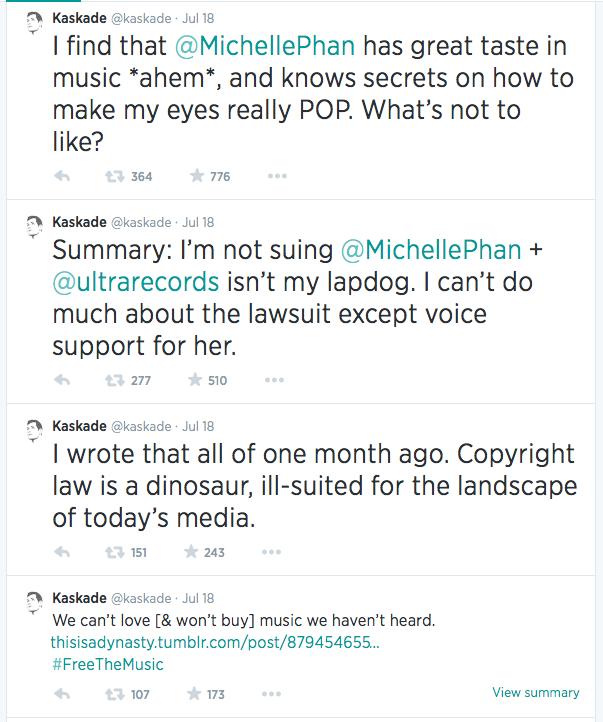Ultra Records Sues YouTube Beauty Guru Michelle Phan
Last month, music label Ultra Records and its publisher, Ultra International Music Publishing (referred to generally in this post as “Ultra”), sued popular YouTube video blogger Michelle Phan for copyright infringement. Ultra is a popular dance-music label and its roster of artists includes Kaskade, deadmau5, and Late Night Alumni.
Ms. Phan is a YouTube sensation whose channel currently boasts over 6.75 million subscribers. Her videos offer makeup and beauty instruction, with the most popular installments garnering tens of millions of views. Phan has been featured in an advertising campaign for YouTube and, according to the complaint, has also monetized her YouTube channel in order to earn ad revenue.
Some of Phan’s videos are set in part to music and Ultra alleges that it has identified over fifty videos in which Phan makes unauthorized use of musical compositions and recordings in which it owns copyright. Ultra alleges that the videos featuring its music have been viewed a combined total of more than 150 million times. Ultra is seeking an injunction and either a disgorgement of Phan’s profits and its actual damages or the maximum statutory damages of $150,000 per infringed work. While Ms. Phan has not yet filed a reply in court, her lawyers have claimed publicly that she had permission from Ultra to include its music in her videos.
Though this case is in its nascency, it is a reminder of some worthwhile lessons for those who produce or otherwise deal with content that is subject to copyright law:
For those producing content – whether you are a small-time blogger, a big business, or someone who has grown from one into the other – this case is an important reminder to make sure that you have cleared all rights to any third-party content that you use. If any part of your content was not created by you, your employee (operating within the scope of his or her employment), or (for some materials) an independant contractor operating under a written work-made-for-hire agreement, confirm that you have the proper license to use that content before doing so (or confirm that the content at issue is in the public domain). Determining the rights of respective parties in any piece of content is often more complicated than simply asking who “made” that content. For example, if the content at issue is an online video, you would want to determine who wrote the script, who filmed the video, what appears in the video (e.g. works of choreography), what can be heard in the video (e.g. is the video set to music?), and so on. In addition to copyright ownership, you would also want to consider the potential right-of-publicity issues and may need to get a waiver from anyone seen, heard, or otherwise depicted in the video. (For more discussion of the right of publicity, see here or here.)
If you are encouraging or outright inviting others to produce content as part of a campaign, sweepstakes, or promotion, this case also serves as a reminder of the importance of a good set of rules. When you are asking people to create content, make sure that the rules require participants to have all necessary rights in the content they submit. Although a general representation to this end and a corresponding indemnity obligation are very important, you also may want to expressly prohibit the use of common copyrightable third-party material in submissions, such as music or artwork. If you are running a contest in which a single contestant submits a video that includes a third party’s music, you may not be likely to find yourself hauled into court. However, if you had hoped to publicly post entries or use them in your promotional materials, the presence of unlicensed third-party content within an entry could undermine that plan. A well-drafted set of promotion rules will make clear to participants what they can and cannot do and, if necessary, will give you the authority to disqualify participants who do not abide by the rules.
Finally, this case should remind content owners of the need to balance the potential gains from enforcement of their rights against the potential damage to their public perception and goodwill. In the days after this case was filed, Kaskade, one of the Ultra artists whose work features heavily in Ms. Phan’s videos, took to Twitter to defend Ms. Phan, note that the suit was not his doing, and add that “[c]opyright law is a dinosaur.” (Which, as legal metaphors go, is an instant classic.)
For Ultra, stopping potentially widespread infringement of its intellectual property may ultimately prove worth it. However, enduring some public shaming in the process was probably not something Ultra hoped for in filing the suit.

